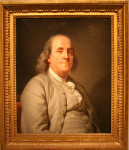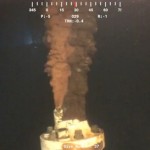We love getting interesting emails from our readers. Some are complaints about our (mostly mine) colorful language, many are emails telling us how they appreciate what we do, several even come from our colleagues who would like us to know about some recent research or a new expedition, and we get many readers asking us specific questions about the ocean and maritime history. Some of these questions can occasionally get us rolling into new territory and is very exciting for us to learn something new! One such question came several weeks ago from Capt. Chris, formerly of the US Coast Guard. He wrote:
We have been searching and searching for the correct nautical term for the act of dumping oil into the water to calm the seas. As a prior USCG vet, I have heard this term but cannot remember it to save my life… Any Ideas?
I did a few quick Google searches, searched a bit of the historical literature and wrote back apologetically,
Thanks for your question, It is a very interesting one. As you probably know we are very intrigued by nautical history. Most of what I know about this practice is referred to as “pouring oil on troubled waters” or some such variant. Ben Franklin actually studied this phenomenon extensively and referred to it as “wave-stilling”. I am unaware of a specific nautical term though. I copied the DSN co-editors in case they might know another term.
I attached 2 documents that are fascinating reads about this if you don’t mind the pdf’s. One is by dutch historian Joost Mertens “The honour of Dutch seamen: Benjamin Franklin’s theory of oil on troubled waters and its epistemological aftermath” and another is a 1884 report by Lieutenant Wyckoff of the US Navy. I plan on reading Franklin’s original paper soon too. Anecdotal evidence but great accounts nonetheless. You have inspired me to write up a post on DSN about this in the near future!
To which he was grateful for the reply.
Ironically we were talking about how devastating it would be to have a hurricane come through the gulf with all the oil sitting there – but then again, perhaps it would ameliorate the hurricane’s effects by limiting evaporation and airborne water spray…
 This idea was a little foreign to me, not because it didn’t make sense to me, but because I was thinking of the enormous scale of a hurricane and the much smaller scale of the oil spill (at that time). There would certainly have to be a lot of oil on the water to have any stilling effect. Now in the 63rd day of the spill with no end in sight, lack of scale seems less of an issue.
This idea was a little foreign to me, not because it didn’t make sense to me, but because I was thinking of the enormous scale of a hurricane and the much smaller scale of the oil spill (at that time). There would certainly have to be a lot of oil on the water to have any stilling effect. Now in the 63rd day of the spill with no end in sight, lack of scale seems less of an issue.
The use of oil on troubled waters was discussed by Aristotle and Pliny, both of who described how Mediterranean divers would coat oil around their eyes to “quiet the surface and permit the rays of light to reach them” (Wyckoff 1886). Additionally, fishing vessels and whalers would carry oil, or whale blubber in the latter case, specifically for use in crossing straits known to have rough weather. As Wyckoff wrote in a very interesting historical review of the use of oil in stormy seas:
Whalers have resorted to oil and blubber, in severe storms, for the last two hundred years. Very recently, an old whaler informed me, that it was their custom to hang large pieces of blubber over, each quarter of their vessel, when running before a heavy sea, and it entirely prevented the water coming on board.
Many scientists have recognized the value of local knowledge, which has provided a springboard to many fruitful areas of basic and applied research. Ben Franklin was the first to systemically collect stories and develop hypotheses that he then experimentally tested during his many years in Europe. He captured many instances of folklore by Captains swearing by fish oil in storms, boatswains letting out barrels of blubber to help make landfall in the whitecaps, and seals eating oily fish and producing calm waters around feeding colonies that Scottish sealers used find them. Like all anecdotes, these were met with skepticism. In a letter Franklin published in 1774 from colleagues Rev. Farish to Dr. Brownrigg,
According to his representation, the water, which had been in great agitation before, was instantly calmed, upon pouring in only a very small quantity of oil, and that to so great a distance round the boat as seems a little incredible. I have since had the same accounts from others, but I suspect all of a little exaggeration. PLINY mentions this property of oil as known particularly to the divers, who made use of it in his days, in order to have a more steady light at the bottom. […]
Old PLINY does not usually meet with all the credit I am inclined to think he deserves. I shall be glad to have an authentic account of the Kerwick experiment, and if comes up to the representations that have been made of it, I shall not much hesitate to believe the old Gentleman in another more wonderful phaenomenon, he relates, of stilling a tempest only by throwing up a little vinegar into the air.

Franklin experimentally tested the stilling effects of oil in natural settings, a first at that time, several instances over the course of 18 years. At first, he made fun of Captain’s suggestions of using oil in rough seas, but being the ardent scientist he was, Franklin put these observations to test. He describes his first experiment at a pond in Clapham Commons, where he often stayed:
At length being at Clapham where there is, on the common, a large pond, which I observed to be one day very rough with the wind, I fetched out a cruet of oil, and dropt a little of it on the water. I saw it spread itself with surprising swiftness upon the surface; but the effect of smoothing the waves was not produced; for I had applied it first on the leeward side of the pond, where the waves were largest, and the wind drove my oil back upon the shore. I then went to the windward side, where they began to form; and there the oil, though not more than a tea spoonful, produced an instant calm over a space several yards square, which spread amazingly, and extended itself gradually till it reached the lee side, making all that quarter of the pond, perhaps half an acre, as smooth as a looking-glass.
Subsequent demonstrations were carried out at other ponds in the UK countryside. Franklin hypothesized that oil reduces the friction between air and the surface of the water. Finally, he was able to convince Capt. Bentnick to help him carry out a large-scale experiment in sea-trial conditions off of Portsmouth. With parties stationed at every angle on a windy day to observe the change in sea state, oil from a barge was poured in a tract starting from the Lee-Shore. While the experiment did not temper the swelling of the sea, Franklin and several of the observers noticed very few white-caps and its “surface was not roughened by the Wrinkles or smaller Waves”. Franklin concluded,
… tho’ Oil spread on an agitated Sea, may weaken the Push of the Wind on those Waves whose Surfaces are covered by it, and so by receiving less fresh Impulse, they may gradually subside; yet a considerable Time, or a Distance thro’ which they will take time to move may be necessary to make the Effect sensible on any Shore in a Diminution of the Surff.
What he is saying is when a force causes water to move, the motion does not stop immediately when the force stops. It ripples away and its intensity lessens with time, assuming no new “impulse”. He suggests the oil weakens the effect of the wind, and more quickly lessening the effects of the “impulse”. Franklin contemplates that more time and starting the oil at a greater distance from the windward-shore may produce a larger stilling effect.
Ben Franklin’s experiments did not definitively conclude the hundreds of years of mariner’s anecdotes. Even today it is not clear whether pouring oil on troubled waters produces the desired effect. Also, I might propose that cases where such a measure succeeds are likely to be reported more often so the anecdotes may be biased.
With the impending hurricane season, some have suggested that the oil may calm the waters, giving the Gulf coast States a reprieve. Indeed over 100 years after Franklin’s paper, Lieut. Wyckoff of the United States Navy reported 115 additional reports from the Hydrographic Office, noting all reported successful uses of oil in stormy seas except four. His last report comes from Captain E.L. Arey of the schooner Jennie A. Cheney,
” I used oil with very satisfactory results during the late severe hurricane of the 25th of August, in latitude 31 N., longitude 790 W. The wind having carried away the mainsail, I bent a storm trysail, and continued under that sail until it also blew away. During the time, the vessel was shipping large quantities of water, the sea being very irregular, nearly every one breaking. After the sails were blown away, finding it necessary to do something to save the ship and crew, I took a small canvas bag and turned about five gallons of linseed oil into it, and hung it over the star- board quarter. The wash of the sea caused a little of the oil to leak out, and smoothed the surface, so that for ten hours no water broke aboard. I consider that the oil used, during the last and heaviest part of the hurricane, saved vessel and crew.”

It is difficult to reconcile all the successful reports that operated on the very localized scale of a single ship and the seas around it with the immense scale of the oil-laden northern Gulf of Mexico. Will wave breaks be tempered by the floating oil slick and plume? I took a look at wave height anomaly and sea surface height from satellite data at a couple stations south of Louisiana and did not notice any appreciable difference from April 1 to June 20 greater than background variation. It appeared there was more scatter after the Deepwater Horizon spill compared to the same dates in 2009, but its really all hand-waving.
Unfortunately, this will inevitably be a horrible, but important, experiment and I will be following it intently. The volume of oil out there and rate of spreading is immense. By the time this summer’s storms come around to the upper Louisiana slope, it will only have grown in size. Accurate measure of surface area of the spill and sea state data will be important to test this hypothesis on such a large scale. All these data are being constantly monitored, so it should be apparent relatively quickly after a major storm whether oil does indeed calm troubled waters.
On the other hand, oil has in smaller scale over the course of a long time been spilling into the northern Gulf for decades. These oil rigs surely leak a little here and there, there have been tanker collisions and other major spills, and lest we forget that the Gulf deep seafloor is covered with naturally occurring gas/oil seeps. MacDonald and colleagues followed the path of oil as it left the seafloor into the water column. They found that there was little chemical alteration in the water column, but at the surface slicks formed and the volatile components rapidly evaporated.
This natural seepage has been occurring for centuries, millenia even. Surely any effect of temperament would already be apparent. Additionally, we may not be to detect any difference if oil is always naturally seeping into the Gulf despite major oil catastrophes occurring in the last 50 years, which could mean either not enough volume present to produce an effect or an effect does not exist.
—————————————————————–
Franklin, Benjamin (1774). Of the Stilling of Waves by means of Oil. Philosophical Transactions of the Royal Society of London, 64, 445-460 DOI: 10.1098/rstl.1774.0044
MacDonald, I., Leifer, I., Sassen, R., Stine, P., Mitchell, R., & Guinasso, N. (2002). Transfer of hydrocarbons from natural seeps to the water column and atmosphere Geofluids, 2 (2), 95-107 DOI: 10.1046/j.1468-8123.2002.00023.x
Mertens, Joost (2008). The honour of Dutch seamen: Benjamin Franklin’s theory of oil on troubled waters and its epistemological aftermath. Hosted at BenFranklin300.org
Wyckoff, Lieut. A.B. (1886). The use of oil in storms at sea Proceedings of the American Philosophical Society, 23 (123), 383-388 (JStor)






Hm. So this Yank goes over to England and starts pouring oil on our ponds, up and down the country. You don’t think BP might just be exacting long-overdue revenge?
No? OK, please yourself.
LOL, well, he heard about from the British Navy captains, who practiced this. So the British were destroying their own coasts much more frequently and for a longer period of time than did Franklin.
The war between two nations for the rights of oil, is this really right.
As far as I can tell, this phenomenon appears to be an effect of oil increasing the water’s surface tension. It will stop white caps (which involve the surface breaking), but I really doubt it will have much of an effect on hurricanes or storms, which are largely fueled by the temperature of the water.
I agree with thinkingspeaker. There is so much we don’t know
In the American Merchants Seaman’s Manual the practice is called using “storm oil”. (7th Ed., pg. 20-22)